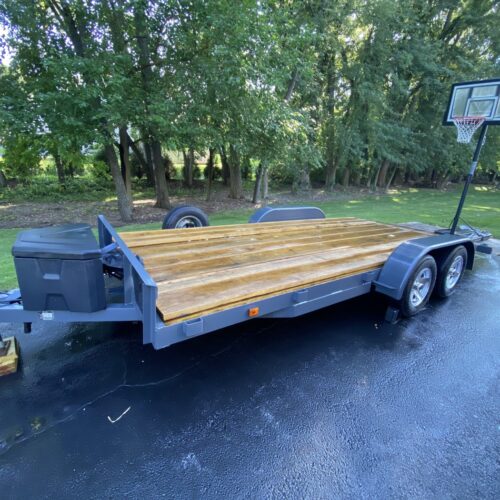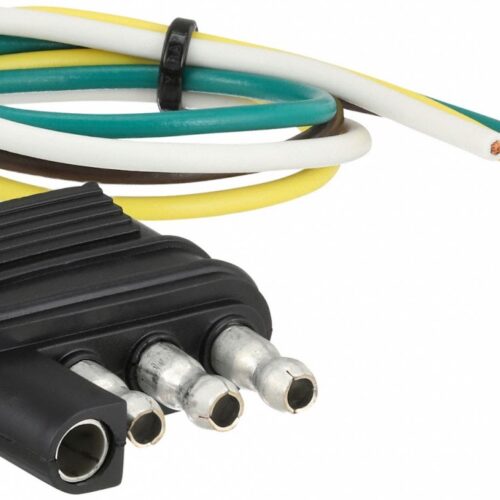Towing a trailer in Ohio requires an understanding of the state’s laws and regulations to ensure safety and compliance. Whether you’re towing for personal or business reasons, it’s important to be aware of the specific requirements that govern trailer use on Ohio’s roads. In this post, we’ll break down the essential trailer towing laws in Ohio, covering weight limits, speed restrictions, and other important guidelines to help you stay safe and legal on the road.

1. Trailer Registration in Ohio
Ohio law mandates that all trailers be properly registered with the Bureau of Motor Vehicles (BMV). The registration process includes obtaining a title for your trailer and paying the required fees based on the weight of the trailer. Trailers with a gross weight exceeding 4,000 pounds must have a separate license plate, while trailers below that weight may not require one but must still be registered.
2. Weight Limits and Towing Capacity
Ohio enforces strict weight limits for trailers to ensure road safety. These limits are measured using the Gross Vehicle Weight Rating (GVWR), which includes the weight of the trailer and its load. Here are some key points to keep in mind:
- Light trailers: If your trailer has a GVWR of 10,000 pounds or less, you can tow it with a non-commercial driver’s license.
- Heavy trailers: For trailers with a GVWR over 10,000 pounds, a commercial driver’s license (CDL) is required.
Make sure to check your vehicle’s manufacturer specifications for the maximum towing capacity, and never exceed this limit, as doing so can cause damage to your vehicle and result in legal penalties.
3. Towing Speed Limits
When towing a trailer in Ohio, the same speed limits generally apply as for regular vehicles. However, it’s important to adjust your driving speed based on road conditions, weather, and the size of your trailer. In some areas, especially construction zones or rural roads, speed limits may be reduced, so always keep an eye on posted signage.
4. Trailer Equipment Requirements
Ohio law outlines specific equipment requirements for trailers to ensure safe towing. Here’s what your trailer needs:
- Lighting: Trailers must have functioning taillights, brake lights, and turn signals. If your trailer is over 80 inches wide, you will also need clearance lights.
- Safety Chains: Ohio requires that all trailers be equipped with safety chains in addition to the hitch. These chains must be crossed and strong enough to prevent the trailer from becoming detached from the tow vehicle.
- Brakes: Trailers with a GVWR over 2,000 pounds must be equipped with their own braking system. This system should be capable of stopping the trailer independently of the towing vehicle.
5. Mirrors
When towing a trailer, Ohio law requires that drivers have clear visibility around their vehicle. This means you must have adequate mirrors on both sides of your tow vehicle to see the trailer and the road behind you. If your trailer is wider than your vehicle, you may need to install extended side mirrors.
6. Towing Multiple Trailers
Ohio allows the towing of two trailers in tandem, but strict guidelines must be followed. The overall length of the towing combination (vehicle and trailers) cannot exceed 65 feet, and an anti-sway device must be used to prevent excessive movement between trailers. The first trailer in the combination must also have an active braking system to ensure safe stopping.
7. Ohio’s Maximum Length, Width, and Height for Trailers
In Ohio, trailers are subject to maximum dimension limits to avoid interfering with traffic flow or damaging infrastructure:
- Maximum length: The overall length of the vehicle and trailer combination cannot exceed 65 feet.
- Maximum width: Trailers cannot be wider than 8.5 feet.
- Maximum height: The total height of the vehicle and trailer combination cannot exceed 13.5 feet.
Oversized trailers that exceed these limits require a special permit from the Ohio Department of Transportation (ODOT) to operate legally on state roads.
8. Towing a Trailer at Night
If you’re towing a trailer at night or in conditions of low visibility, Ohio law mandates that trailers be equipped with reflective markers and lights. These markers must be visible from the rear and sides of the trailer to alert other drivers to the presence of your load.
9. Fines and Penalties for Violations
Failing to comply with Ohio’s trailer towing laws can result in fines, penalties, and potentially having your trailer impounded. Some of the most common violations include exceeding weight limits, failing to secure safety chains, or not having functioning lights. Avoid these costly mistakes by ensuring your trailer meets all legal requirements before hitting the road.
Conclusion
Towing a trailer in Ohio requires careful attention to the state’s specific laws and regulations. From ensuring your trailer is properly registered and equipped with the necessary safety features to following weight and size limits, staying compliant is key to a smooth towing experience. Always double-check your equipment, be mindful of speed limits, and make sure your trailer is road-ready before embarking on your journey.




